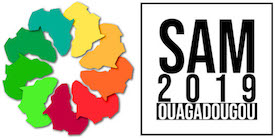On  the second day of this week’s SAM conference in Burkina Faso, Mathieu Soglonou of the UN Capital Development Fund commented on several of the UN’s Sustainable Development Goals (SDGs) in a session on the “State of the Inclusive Finance Sector and Its Contributions to Development in Africa.” Despite general progress toward the SDGs, Mr Soglonou noted that there have been setbacks in SDG 2, “Zero Hunger.” The number of people living with hunger has increased by 800 million due to problems such as extreme weather, war, and difficulties with the storage and distribution of agricultural products. Mr Soglonou noted that one challenge in reducing hunger is that lenders tend to be more interested in investing in cash crops than foods grown to be eaten locally.
the second day of this week’s SAM conference in Burkina Faso, Mathieu Soglonou of the UN Capital Development Fund commented on several of the UN’s Sustainable Development Goals (SDGs) in a session on the “State of the Inclusive Finance Sector and Its Contributions to Development in Africa.” Despite general progress toward the SDGs, Mr Soglonou noted that there have been setbacks in SDG 2, “Zero Hunger.” The number of people living with hunger has increased by 800 million due to problems such as extreme weather, war, and difficulties with the storage and distribution of agricultural products. Mr Soglonou noted that one challenge in reducing hunger is that lenders tend to be more interested in investing in cash crops than foods grown to be eaten locally.
Regarding SDG 8, “Decent Work and Economic Growth,” Mr Soglonou noted that, while only 35 percent of people in Africa have accounts at financial institutions, the rise of digital financial services is increasing this ratio. Philippe Guichandut of the Grameen Credit Agricole Foundation commented that, despite the low average rate of inclusion in Africa, several regions have significantly higher rates. He cited East Africa and Southern Africa as among those in which more people are financially included and noted, “West Africa is on the right track.”
Mr Guichandut also referred to data from Symbiotics on 87 private microfinance investment funds (MIVs). The MIVs have 8 percent of their portfolios, a total of USD 2.4 billion, placed in Africa. They described interest in boosting that level, but cited impediments including the low capitalization levels of many microfinance institutions (MFIs), low portfolio quality, governance issues and lack of scale.
Wango Fidele Yameogo, Burkina’s Permanent Secretary for the Promotion of Microfinance, commented on the situation in his country. With over 80 percent of the population using mobiles, he said “mobile phone penetration has really boosted financial inclusion.” Unfortunately, conflict, largely in northern Burkina, has displaced 500,000 people. Although some MFI branches have closed because of the conflict, he argues that “MFIs are cornerstones” of working in these difficult areas.
One area of progress for Burkina is bringing together banks, mobile network operators, MFIs and financial technology (fintech) firms to support the country’s third multi-year plan for financial inclusion. These stakeholders comprise a digital finance working group, which is just one of the four working groups supporting the plan. This ties in to SDG 17, “Partnerships for the Goals.”
Regarding mobile connectivity, Mr Soglonou explained a strategy UNCDF has used to encourage mobile network operators to bring 3G service into more rural areas. UNCDF guarantees their investments, but the firms so far have been able to recoup their costs, so UNCDF has incurred no expense. Now UNCDF is pursuing similar arrangements to expand the reach of 4G technology.
Despite widespread excitement about the potential of digital financial services, Mr Guichandut cited concerns such as the unregulated blacklisting of 2 million “nanoborrowers” in Kenya. Much as microfinance once was regarded wrongly as a silver bullet for ending poverty, Mr Guichandut warns that digital finance is not a panacea. He referred instead to a recent conversation he had with a microlender about the idea of finding a balance between impersonal technology-based services and traditional “high-touch” microfinance, which involves significant face time between customers and MFI staff.
When it comes to agricultural finance, Mr Guichandut argued that “commercial-only is not appropriate.” Given the risks inherent in agricultural lending, which are exacerbated by climate change, he suggested that governments may need to continue to offer blended tools such as guarantees. Partnerships with NGOs that can provide training in topics such as agronomy and leadership can be critical.
This article is part of a sponsored series on SAM (the French acronym for African Microfinance Week), a major conference dedicated to financial inclusion in Africa. SAM, which is taking place in Ouagadougou, Burkina Faso, ends today!
ADA, an NGO based in Luxembourg, co-organizes SAM every two years with the support of Luxembourg’s Ministry for Development Cooperation and Humanitarian Affairs. The SAM steering committee members are: ADA, Luxembourg’s Ministry of Foreign and European Affairs, the Microfinance African Institutions Network, the African Rural and Agricultural Credit Association, and the Fédération des Association Professionnelle des Systèmes Financiers Décentralisés de l’Union Economique et Monétaire Ouest Africaine. We invite you to learn more about SAM at http://www.sam.africa.
MicroCapital has been contracted to promote and perform on-site documentation of each SAM since 2015.
Additional Resources
Other MicroCapital coverage of SAM and vignettes demonstrating its value to participants
http://www.microcapital.org/category/semaine-africaine-de-la-microfinance-sam/
Vignettes demonstrating the value of SAM en francais
https://www.ada-microfinance.org/fr/evenements/semaine-africaine-microfinance/objectif-sam-2019/paroles-de-nos-participants
Similar Posts:
- MICROCAPITAL BRIEF: UNCDF, Bill & Melinda Gates Foundation Launch Mobile Money Program in Ethiopia
- MICROCAPITAL BRIEF: Jeevan Bikas, Pula, UNCDF Partner on Index Insurance for Farmers in Nepal
- MICROCAPITAL BRIEF: OPEC Fund Donating $1m to UNCDF to Boost Energy Access, Reduce Emissions, Starting in Madagascar, Tanzania
- MICROFINANCE PAPER WRAP-UP: “Driving Digital Financial Services in Africa Through Merchant Acceptance of Digital Payments,” published by Alliance for Financial Inclusion (AFI)
- MICROCAPITAL BRIEF: ILO, UNCDF to Expand PICAP Climate Microinsurance Program to 8 Pacific Countries
